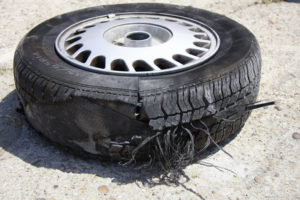How to Handle a Tire Blowout
The National Highway Traffic Safety Administration reports that there are 75,000 tire blowouts a year. So what should you do if you have a tire blowout? Remain calm and do not slam on the brakes. Bring the vehicle to a slow and controlled stop. If your able, get the vehicle to a safe location such as the shoulder. If there is no spare tire available, or the driver is not able to change it themselves, call your preferred or closest auto towing company for help. The best way to avoid this situation is to prevent a tire blowout and tire blowout damage altogether. The best way to prevent this is to understand what causes a tire blowout.
Maintenance

Under-inflation is one of the most common tire blowout causes. The air pressure inside the tire allows it to carry the weight of the vehicle properly. When a tire is not inflated properly, the materials that make it up are stressed beyond what they are designed for. Tire pressure monitor systems are standard on cars today, but they will only alert the driver when the tire is critically low. The best way to avoid tire failure from under-inflation is to check the tire pressure regularly, at least every two weeks. The manufacturer suggested tire pressure can be found on the door jam of the vehicle. Overloading a vehicle, especially combined with under-inflation, can also be what causes a tire blowout. The weight rating of the vehicle can also be found on the door jam.
Road Hazards
Damage to a tire could cause a tire blowout immediately, or overtime. An impact with a pothole or a curb puts excessive pressure on the tires. Damaged tires can fail later down the road, making a high-speed tire blowout possible. If a tire undergoes this kind of stress, have it inspected by a service professional at the earliest possible time. Punctures are another form of damage to look out for. A puncture in a tire can cause a slow leak. If a vehicle's tires are low, inspect them for punctures before filling and driving on them. A low hissing noise from the tire is also an indication of a slow leak. Catching a puncture or slow leak could save you from a high-speed tire blowout.
Safe Driving
Understanding what causes a tire blowout and what should you do if you have a tire blowout is important for every motorist. Tire blowout damage can be costly to repair. Any damage to the body of the car from the damaged tire could put the vehicle in the shop for a while. Most tire blowout causes are easy to identify and avoid with proper maintenance. Enjoy a better drive and peace of mind by inspecting your tires regularly.
